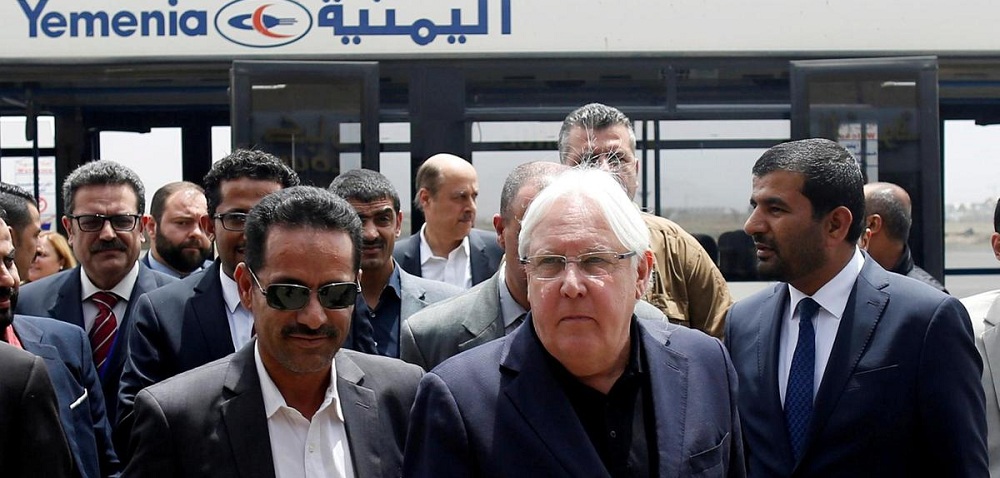Alwaght- A week of intra-Yemeni talks in Sweden, which began on December 6, has led to an agreement to halt the fighting in the two southern provinces of Taiz and Hudaydah. According to the United Nations Secretary-General Antonio Guterres, the negotiating sides have agreed to hold their fire in the two provinces and facilitate the humanitarian aids delivery to the people there. The prisoner swap is another area where, according to the statement read by Guterres, the negotiators reached an agreement. The UN chief added that the next round of talks will be held in January next year.
The Yemeni warring sides are reaching this deal after four years of war, which became devastating by the intervention of the Saudi-led Arab coalition in March 2015 to restore to power the resigned President Abdrabbuh Mansour Hadi. In fact, the Yemeni groups have agreed a specific framework to implement the accords. The chief of the Coordination Committee of the peace initiative is tasked with providing the UN secretary-general with weekly updates on how the implementation of the agreement is going.
Alwaght has talked to the Saadullah Zarei, an international affairs expert, asking him to give a clear picture of what the intra-Yemeni agreement will mean.
Ansarullah stronger after the agreement
Commenting on the achievements of the deal for the Yemeni groups, Mr Zarei told that the most important part of the deal, which is a great achievement for Ansarullah, is the Saudi coalition and its loyalists on the ground agreeing to halt their attacks on Hudaydah port city, though the coalition fighter jets kept violating it over the past two days. He added that the truce, in fact, gave the Ansarullah defense of the port city in the face of the Arab forces international legitimacy. This, he continued, will boost the movement’s position on the ground.
The Iranian expert pointed to another achievement brought to Ansarullah, a leading party in the Yemeni revolution that three years ago ousted the Saudi puppet Mansour Hadi from power.
“It is related to the call for the foreign forces to pull out of Hudaydah. Despite the fact that the Yemeni forces have not made a deal on the Saudi and Emirati troops’ withdrawal, the very raising of the case which won the green light of the United Nations secretary-general was a big accomplishment for Ansarullah. A large part of the forces fighting Ansarullah and popular committees are foreign mercenaries and troops.”
He noted that the withdrawal of the foreign fighters, sent from Saudi Arabia, the UAE, Sudan, and other countries, will, on the one hand, beef up the movement’s defensive stance and, on the other hand, work for the good of preparation of the ground for genuine intra-Yemeni dialogue unaffected by the foreign meddling.
Hudaydah agreement exhibits Saudi, UAE setback
Alwaght asked Mr Zarei why the Saudis and Emiratis showed the about-face and agreed to allow the Stockholm initiative to go ahead whereas they frequently insisted that their forces should wrest control of the Hudaydah port, a major lifeline to the whole country which has been under a full blockade by the coalition for four years. He replied that surrounding Hudaydah issue, there were three viewpoints before the negotiations. First one, heavily supported by Saudi Arabia and the UAE, insisted that the port city should be run by the government of the fugitive president who shortly after resignation fled the country to Saudi Arabia and called for war on his own people. The second one, raised by the UN, suggests administration of Hudaydah by the UN. And the third one, proposed by Ansarullah, eyes de-confliction in the major port city.
“With regard to the three viewpoints, we can apparently see that the Stockholm process yielded accurately the third model, raised by Ansarullah. The drive behind the shift of Saudi Arabia and the UAE stances rests in their conviction that their strategy reached an impasse.”
Riyadh and Abu Dhabi had to accept the Stockholm agreement
Mr Zarei, the head of Andisheh Sazan Nour strategic studies institute in Tehran, also commented on the sustainability of the deal, saying that so far the Saudis and their allies breached the accord because they are unhappy with the outcome. But they also know that fully opposing the deal will bear heavy consequences for them. “So, we can predict that at the end of the road, Saudi Arabia and the UAE will fully come to terms with the de-escalation of the tensions.”
Ansarullah place in future Yemen developments secured
Mr Zarei was asked about how the agreement will contribute to the place of Ansarullah in future equations. He answered that Ansarullah has fixed up its military position. Because it so far repelled four rounds of attacks on Hudaydah by the Riyadh-led aggression forces. The accomplishment comes while the Yemeni movement and the aggressive coalition were incomparable in terms of weight and equipment. In addition to the military arena, in diplomatic aspect which is marked by Stockholm negotiations Ansarullah showed that it is a reliable and visionary force that can be entrusted with a special place in the peace process.



























